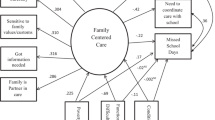Abstract
An increasing number of schools and youth service organizations are developing school-age child care programs to serve children who wound otherwise be left in self-care. The purpose of this study was to identify the differences between families using a self-care arrangement and the implications of these differences for school-age child care program development. A sample of 164 families with school-age children in self-care (or the care of another school-age sibling), was drawn from a Southern metropolitan school system. Parents were surveyed about their self-care arrangement, the types of school-age child care services they needed, and barriers to having those needs met. Using discriminant analysis, the 164 families were reclassified into three groups. The resulting family profiles are examined in relation to school-age child care program development.
Similar content being viewed by others
References
Bower, D. (1986).Care of myself. (Available from The University of Georgia Extension Service, Hoke Smith Annex, Athens, GA 30602).
Cain, V. S., & Hofferth, S. L. (1989). Parental choice of self-care for school-age children.Journal of Marriage and the Family, 51 (1), 65–77.
Cole, C., & Rodman, H. (1987). When school-age children care for themselves: issues for family life educators and parents.Family Relations, 36 (1), 92–96.
Coleman, M. (1984).Families with latchkey children: A study with implications for service delivery. Unpublished doctoral dissertation, University of Georgia, Athens.
Coleman, M., Robinson, B. E., & Rowland, B. H. (in press). Children in self-care: An examination of research confounds.Children and Youth Services Review.
Cyr, L. F., Holmes, V. J., & Kelly, J. M. (1987).3 to 5, I'm in charge. (Available from the University of Maine Cooperative Extension Service, Roger Clapp Greenhouse, Orono, 04469).
Galambos, N. L., & Dixon, R. A. (1984). Toward understanding and caring for latchkey children.Child Care Quarterly, 13 (2), 116–125.
Long, T. J., & Long, L. (1981).Latchkey children: The child's view of self-care. Urbana, IL: ERIC/EECE (ED 211 229), College of Education, University of Illinois.
Long, L., & Long, T. J. (1983).Latchkey children. Urbana, IL: ERIC/EECE (ED 226 836), College of Education, University of Illinois.
McMurray, G. L., & Kazanjian, D. P. (1982).Day care and the working poor: The struggle for self-sufficiency. New York: Community Service Society.
Robinson, B. E., Rowland, B. H., & Coleman, M. (1986).Latchkey kids: Unlocking doors for children and their families. Lexington, MA: Lexington Books.
Rodman, H., Pratto, D. J., & Nelson, R. S. (1988). Toward a definition of self-care children: A commentary on Steinberg.Developmental Psychology, 24, (2), 292–294.
Sparks, S. (1983).The key to being on my own. Unpublished master's thesis, University of North Carolina, Charlotte.
Steinberg, L. (1986). Latchkey children and susceptibility to peer pressure: An ecological analysis.Developmental Psychology, 22, (4), 433–439.
Steinberg, L. (1988). Simple solutions to a complex problem: A response to Rodman, Pratto, and Nelson.Developmental Psychology, 24 (2), 295–296.
Todd, C. M. (1986).Operation safe kids. (Available from the University of Illinois Cooperative Extension Service, 547 Bevier Hall, 905 South Goodwin Ave., Urbana, 61801).
Woods, M. B. (1972). The unsupervised child of the working mother.Developmental Psychology 6 (1), 14–25.
Author information
Authors and Affiliations
Additional information
This study was supported by a grant from the Council for Children, Charlotte, North Carolina.
Rights and permissions
About this article
Cite this article
Coleman, M., Robinson, B.E. & Rowland, B.H. A typology of families with children in self-care: Implications for school-age child care programming. Child Youth Care Forum 22, 43–53 (1993). https://doi.org/10.1007/BF00868990
Issue Date:
DOI: https://doi.org/10.1007/BF00868990




